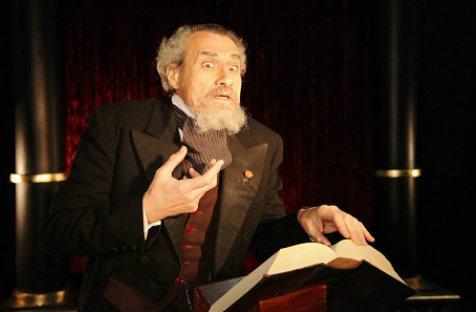A good story combined with a good story-teller can turn the most adult of us into gawping children. Charles Dickens performs a Christmas Carol provides just such an opportunity.
With this production, Eagles Nest Theatre Company invites the audience to time travel back to the mid-19th century to hear Dickens’ potent parable in its original splendour – with the presence of a small band of youngsters dressed in Victorian costumes and singing traditional English carols in the foyer of the Athenaeum Theatre adding to the evening’s charms on opening night.
Actor Phil Zachariah and director James Adler have together recreated the experience of seeing Charles Dickens reading his tale of Ebenezer Scrooge, adhering to the original 1853 performance as closely as possible. They achieved this by sourcing the original prompt copy of the tale and contemporary eyewitness accounts, as well as calling on the knowledge of a great fan of Dickens: English actor Simon Callow, with whom Zachariah is in regular contact.
Phil Zachariah appears as the waistcoated, bearded Dickens. A small, stand-alone red curtain hangs behind him, flanked by two small columns; in front of it, a book stand and a glass of water. The flowery, descriptive language of Dickens, combined with Zachariah’s highly animated and energised delivery, soon fills the darkness with the juicy characters Dickens was renowned for.
For those whose recall of this story is a little foggy, A Christmas Carol tells the tale of Scrooge; a friendless London businessman who lacks both benevolence and a sense of community. He blasts any who dare to approach him with a hint of festive cheer with ‘Bah humbug!’. One Christmas Eve, Scrooge is visited by the ghost of his dead business partner, Jacob Marley. Marley’s visit is followed by three more spectres: the ghosts of Christmas Past, Christmas Present and Christmas Yet to Come. The invaluable insights that these ghosts bestow on the very reluctant Scrooge lead to the delicious outcome of a man released from his selfishness and suddenly aglow with joy which he then goes forth to bestow on all around him.
The Athenaeum audience stood in ovation as Zachariah spoke his final words of this very potent novella. Even the large school group of 11 year olds behind me, who fidgeted through the first half, were laughing unashamedly through the second half at the show. My eight-year old companion declared, ‘The best bit was when the man turned good’.
Dickens, who was very concerned about the deplorable social conditions of the disadvantaged in Victorian society, wrote A Christmas Carol in 1843, having abandoned his original idea of writing a political pamphlet called ‘An Appeal to the People of England, on behalf of the Poor Man’s Child’. Like other writers such as Victor Hugo, Harriet Beacher Stowe or Elizabeth Gaskell, who used their ability to pen fiction to awaken a sleeping, over-fed ruling class, Dickens’ story remains a rallying call to those jaded members of the audience who wish, at this time of year, that Christmas would just go away.
The Scrooge within all of us is admonished. A Christmas Carol awakens its listeners to the joy of giving and the power of generosity, and is a strong warning against heading down the path of selfish gain. It touches on the discomfort of watching this country’s annual frenzy of consumption while the majority of the planet’s population is wanting. And like the wealthy of 1850s England, the author strongly reminds the audience that, though locked within a political system of inequality, the liberty of personal ethical action, such as giving to the poor, remains ours, and can a source of great joy for all, giver and receiver.
This production – a classical one – is largely successful. Sometimes the exaggerated nature of Zachariah’s personifications are a trifle detracting; for example, Bob Cratchit was rather more stupid than my reading of the text had conjured him. Similarly, the laundress’s dignity was rather impinged upon by her exaggerated speech impediment.
Zachariah is a dynamic, physical performer and his charisma, combined with Dickens’ story, ultimately makes for a stirring and joyous theatrical experience. In fact, there is a distinct possibility that this show could become an Antipodean Christmas institution in itself.
Rating: 4 stars out of 5
Eagle’s Nest Theatre Company present
Charles Dickens performs A Christmas Carol
Directed by James Adler
Performed by Phil Zachariah
Athenaeum Theatre, Melbourne
5 – 9 December





